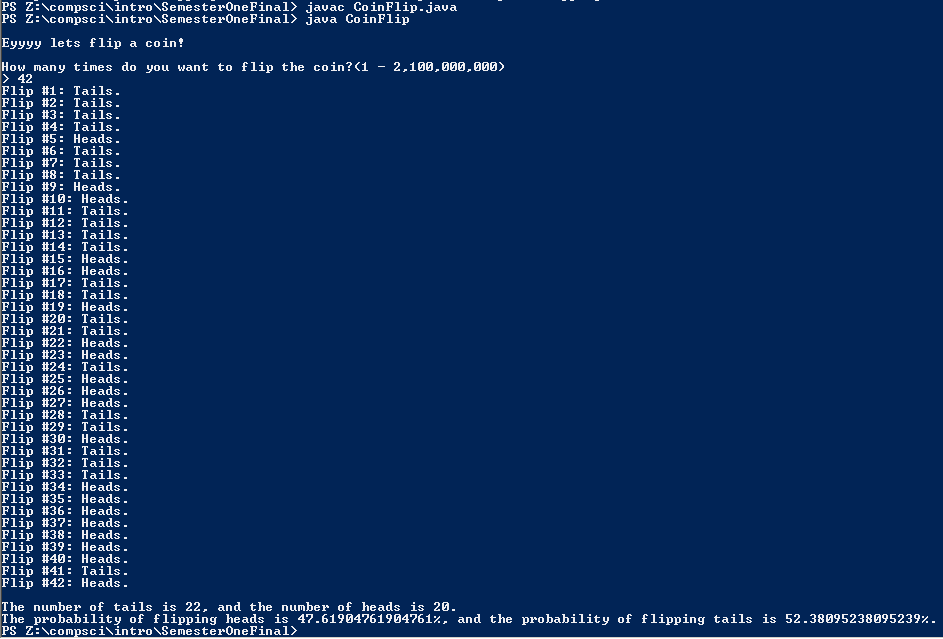Semester Final: Coin Flip
Code
/// Name: Kelsey Lieberman
/// Period 5
/// Program Name: CoinFlip
/// File Name: CoinFlip.java
/// Date Finished: 1/20/2016
import java.util.Scanner;
import java.util.Random;
public class CoinFlip
{
public static void main(String[] args)
{
Scanner keyboard = new Scanner(System.in);
Random rng = new Random();
int flips, numTails = 0, numHeads = 0, rerun = 1;
///"flips" is number entered by user to determine how many times to run the for loop. numTails and numHeads will be the number of times the coin landed on heads or tails.
/// "rerun" is just to run the beginning of the program again if the user inputs an invalid number
double probOfHeads, probOfTails;
///these doubles will be the probability of the coin landing on heads or tails based off the result of each flip recorded in the for loop.
do{
System.out.println("\nEyyyy lets flip a coin!");
System.out.println("\nHow many times do you want to flip the coin?(1 - 2,147,483,647)");
System.out.print("> ");
flips = keyboard.nextInt();
if (flips < 0 || flips > 2147483647)
rerun = 0;
/// gives rerun a value so the dowhile loop can be given a conditional
}while (rerun == 0);
///do-while loop so program runs once before user enters a number for "flips" and more efficient than while loop in this case.
for (int x = 1; x <= flips; x++)
///for loop because I need a part of the program to run a certain number of times, as entered by the user, and this is the most efficient way to accomplish that, that I know of.
{
int z = 1 + rng.nextInt(2);
/// will give me a "random" number between 1 and 2. Inside the for loop because it has to be randomly generated for each iteration.
String result;
/// will change depending on whether z is 1 or 2, this will be the result of the coin flip.
if (z == 1)
{
result = "Heads";
numHeads++;
}
else
{
result = "Tails";
numTails++;
}
///^^ these assign "result" a value of "Heads" or "Tails" depending on whether z is 1 or 2.
System.out.println("Flip #" + x + ": " + result + ".");
}
System.out.println("\nThe number of tails is " + numTails + ", and the number of heads is " + numHeads + ".");
probOfHeads = ((double)numHeads / flips) * 100;
probOfTails = ((double)numTails / flips) * 100;
/// x100 because that will make it a percentage instead of a decimal.
System.out.println("The probability of flipping heads is " + probOfHeads + "%, and the probability of flipping tails is " + probOfTails + "%.");
}
}
/* An infinite number of flips are necessary to get as close to a consistent 50% chance of heads or tails being flipped as possible. The more flips,
the closer the probability of getting heads or tails is to 50%, consistently. Since an int only goes up to 2,147,483,647, then 2,147,483,646 (because it is divisible by 2)
is the number of flips necessary to get closest to a 50% of getting either heads or tails in this program. */
Picture of the output
